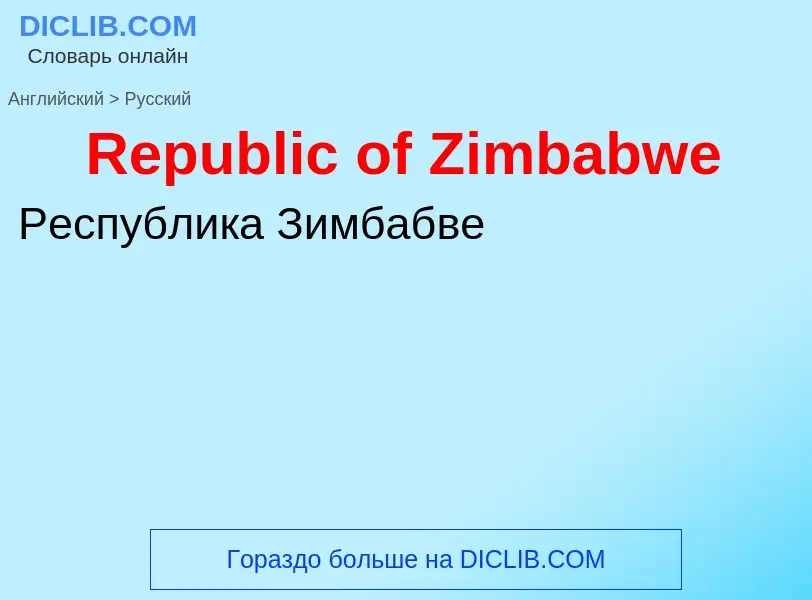Traducción y análisis de palabras por inteligencia artificial ChatGPT
En esta página puede obtener un análisis detallado de una palabra o frase, producido utilizando la mejor tecnología de inteligencia artificial hasta la fecha:
- cómo se usa la palabra
- frecuencia de uso
- se utiliza con más frecuencia en el habla oral o escrita
- opciones de traducción
- ejemplos de uso (varias frases con traducción)
- etimología
Republic of Zimbabwe - traducción al ruso
[zim'bɑ:bwiən]
прилагательное
[zim'bɑ:bwiən]
общая лексика
житель или уроженец Зимбабве
относящийся к Зимбабве
Definición
.
Wikipedia
Zimbabwe (), officially the Republic of Zimbabwe, is a landlocked country in Southern Africa, between the Zambezi and Limpopo Rivers, bordered by South Africa to the south, Botswana to the south-west, Zambia to the north, and Mozambique to the east. The capital and largest city is Harare. The second largest city is Bulawayo. A country of roughly 15 million people, Zimbabwe has 16 official languages, with English, Shona, and Ndebele the most common. Beginning in the 9th century, during its late Iron Age, the Bantu people (who would become the ethnic Shona) built the city-state of Great Zimbabwe; the city-state became one of the major African trade centres by the 11th century, controlling the gold, ivory and copper trades with the Swahili coast, which were connected to Arab and Indian states. By the mid 15th century, the city-state had been abandoned. From there, the Kingdom of Zimbabwe was established, followed by the Rozvi and Mutapa empires.
The British South Africa Company of Cecil Rhodes demarcated the Rhodesia region in 1890 when they conquered Mashonaland and later in 1893 Matabeleland after a fierce resistance by Matabele people known as the First Matabele War. Company rule ended in 1923 with the establishment of Southern Rhodesia as a self-governing British colony. In 1965, the white minority government unilaterally declared independence as Rhodesia. The state endured international isolation and a 15-year guerrilla war with black nationalist forces; this culminated in a peace agreement that established universal enfranchisement and de jure sovereignty as Zimbabwe in April 1980. Zimbabwe then joined the Commonwealth of Nations, from which it was suspended in 2002 for breaches of international law by its government under Robert Mugabe and from which it withdrew in December 2003.
Mugabe became Prime Minister of Zimbabwe in 1980, when his ZANU–PF party won the general election following the end of white minority rule; he was the President of Zimbabwe from 1987 until his resignation in 2017. Under Mugabe's authoritarian regime, the state security apparatus dominated the country and was responsible for widespread human rights violations. From 2000 to 2009 the economy experienced decline and hyperinflation before rebounding after the use of currencies other than the Zimbabwean dollar was permitted, although growth has since faltered. On 15 November 2017, in the wake of over a year of protests against his government as well as Zimbabwe's rapidly declining economy, Mugabe was placed under house arrest by the country's national army in a coup d'état, and Mugabe resigned six days later. Emmerson Mnangagwa has since served as Zimbabwe's president.
Zimbabwe is a member of the United Nations, the Southern African Development Community, the African Union, and the Common Market for Eastern and Southern Africa.

![A market in [[Mbare, Harare]] A market in [[Mbare, Harare]]](https://commons.wikimedia.org/wiki/Special:FilePath/2010 market Harare Zimbabwe 5866074969.jpg?width=200)
![The [[Battle of the Shangani]] on 25 October 1893 The [[Battle of the Shangani]] on 25 October 1893](https://commons.wikimedia.org/wiki/Special:FilePath/Battle of the Shangani.jpg?width=200)
![Raw ''[[boerewors]]'' Raw ''[[boerewors]]''](https://commons.wikimedia.org/wiki/Special:FilePath/Boerewors raw.jpg?width=200)
![2016 Olympic Games]] 2016 Olympic Games]]](https://commons.wikimedia.org/wiki/Special:FilePath/Canada wins Zimbabwe in Rio Olympics 07.jpg?width=200)
![An elephant at a water hole in [[Hwange National Park]] An elephant at a water hole in [[Hwange National Park]]](https://commons.wikimedia.org/wiki/Special:FilePath/Curled trunk.jpg?width=200)
![Movement for Democratic Change]] in 2005 Movement for Democratic Change]] in 2005](https://commons.wikimedia.org/wiki/Special:FilePath/Election campaign March 2005.jpg?width=200)
, % of world average, 1960-2012; Zimbabwe, South Africa, Botswana, Zambia, Mozambique.png?width=200)
![[[Parliament of Zimbabwe]] in Harare [[Parliament of Zimbabwe]] in Harare](https://commons.wikimedia.org/wiki/Special:FilePath/Harare parlament 24032005.jpg?width=200)
![A Matabele [[kraal]], as depicted by [[William Cornwallis Harris]], 1836 A Matabele [[kraal]], as depicted by [[William Cornwallis Harris]], 1836](https://commons.wikimedia.org/wiki/Special:FilePath/Harris - Ndebelekraal.png?width=200)
![Fort Salisbury]] on 13 September 1890. Fort Salisbury]] on 13 September 1890.](https://commons.wikimedia.org/wiki/Special:FilePath/Hoisting the flag at Fort Salisbury.png?width=200)
![Lord Carrington]]. Lord Carrington]].](https://commons.wikimedia.org/wiki/Special:FilePath/Lancaster-House-Agreement.png?width=200)
![Life expectancy in select Southern African countries, 1950–2019. [[HIV/AIDS]] has caused a fall in life expectancy. Life expectancy in select Southern African countries, 1950–2019. [[HIV/AIDS]] has caused a fall in life expectancy.](https://commons.wikimedia.org/wiki/Special:FilePath/Life expectancy in select African countries, 1950–2019.jpg?width=200)
![Mother of Peace AIDS orphanage, [[Mutoko]] (2005) Mother of Peace AIDS orphanage, [[Mutoko]] (2005)](https://commons.wikimedia.org/wiki/Special:FilePath/MOP 50.jpg?width=200)
![Zimbabwean President [[Robert Mugabe]] attended the Independence Day celebrations in South Sudan in July 2011. Zimbabwean President [[Robert Mugabe]] attended the Independence Day celebrations in South Sudan in July 2011.](https://commons.wikimedia.org/wiki/Special:FilePath/Mugabe - Flickr - Al Jazeera English.jpg?width=200)
!["Reconciliation", a [[stone sculpture]] by [[Amos Supuni]] "Reconciliation", a [[stone sculpture]] by [[Amos Supuni]]](https://commons.wikimedia.org/wiki/Special:FilePath/Reconciliation Amos Supuni Woerden.jpg?width=200)
![[[St. George's College, Harare]] was established in 1896 by a French [[Jesuit]]. [[St. George's College, Harare]] was established in 1896 by a French [[Jesuit]].](https://commons.wikimedia.org/wiki/Special:FilePath/Saint-Georges-College.jpg?width=200)
![Towers of [[Great Zimbabwe]] Towers of [[Great Zimbabwe]]](https://commons.wikimedia.org/wiki/Special:FilePath/Tower, Great Zimbabwe1.jpg?width=200)
![Unilateral Declaration of Independence]] on 11 November 1965 with his cabinet in audience Unilateral Declaration of Independence]] on 11 November 1965 with his cabinet in audience](https://commons.wikimedia.org/wiki/Special:FilePath/Udi2-rho.jpg?width=200)
![[[Victoria Falls]], the end of the upper [[Zambezi]] and the beginning of the middle Zambezi [[Victoria Falls]], the end of the upper [[Zambezi]] and the beginning of the middle Zambezi](https://commons.wikimedia.org/wiki/Special:FilePath/Victoria5.jpg?width=200)

![The [[Zambezi River]] in the [[Mana Pools National Park]] The [[Zambezi River]] in the [[Mana Pools National Park]]](https://commons.wikimedia.org/wiki/Special:FilePath/ZmbziRvr.jpg?width=200)
